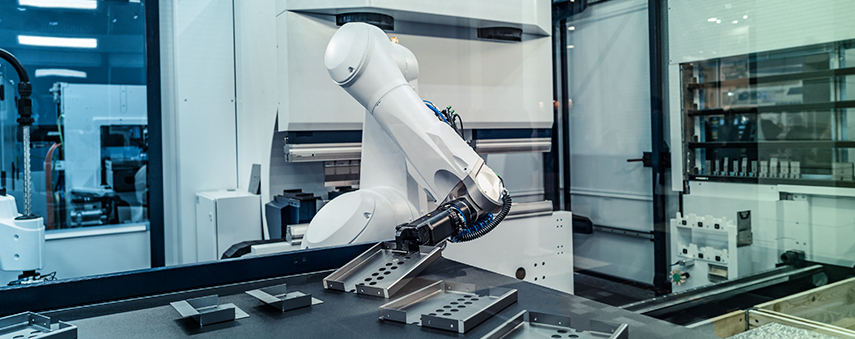Where do humans fit into Industry 4.0?

In the infancy of the fourth industrial revolution, Industry 4.0, we will need to keep up with technological advancements or be left behind
Two hundred and fifty years ago, in the mid 18th century, technologies previously unimaginable began to surface across the world. From manufacturing to farming, peoples’ lives were made a little easier.
This progress brought about a chain reaction of technological advancements, each one far more superior than the last. Hand tools made way for powered machines, which lead to specialisation and mass production. Now, as we find ourselves in the dawning of the fourth industrial revolution, what can we expect to see? And where do we fit into a fully automated system?
Where are we now?
In the early stages of Industry 4.0, we’ve seen real-world applications for fully formed systems, and tantalising glimpses of fledgling technologies.
Take driverless vehicles. What was once the stuff of sci-fi not so long ago now seems commonplace. Autonomous vehicles are on our roads. Businesses are already using them to improve their efficiency and save money. As we move towards global 5G connectivity, the advent of completely autonomous vehicles and infrastructure on our streets becomes even more of a reality. They’ve had their difficulties, and still have a long way to go, but the strides being made by automakers mean that science fiction is now science fact.
The integration of computers, robotics and automation into the workplace during the third industrial revolution is now being built upon even further. The automotive industry has looked to automation and robotics to complete dangerous or laborious tasks with precision and speed since the 1960s. Now, we move towards a future where automakers like Tesla plan for fully-automated, human-free factories.
The real driving force behind Industry 4.0, however, will be AI and machine learning.
Cognitive computing’s role cannot be understated. A network’s ability to communicate and learn from a data set will determine its ability to proliferate autonomously. A machine will be able to complete complex tasks and learn from its own work pattern, becoming more efficient. The potential is there for machines to tap into other machines, using IoT, to learn from those as well.
Eventually, given enough time and data, machines will reach the technological singularity, the point at which AI becomes super-intelligent and develops itself at an exponential rate. For the smart workplaces of tomorrow, this prospect could leave many disenfranchised, wondering where they fit into all of this.

Where do we fit into Industry 4.0?
It sounds almost dystopian, but runaway Artificial Super-Intelligence (ASI) doesn’t necessarily mean the end of humanity’s relationship to work as we know it. Some futurists and thinkers look at the utopia. The possibility of a workless and worker-less society, where humankind is able to tap into their innate human capabilities in order to restore humanity, leaving more time for socialising, art, family or charity.
However, some philosophers and industry commentators have been quick to warn us about the dangers of being superseded by AI.
“…from the perspective of human history, there has never been a time of greater promise or potential peril.”
Klaus Schwab
Yuval Noah Harari, the best-selling author of Sapiens and Homo Deus, is often critical of this unfolding industrial revolution. Harari warns of the creation of “the useless class”, a generation of people who have not been educated in the fields of AI, science and computing. He informs us that people will be left behind if our education system doesn’t change immediately. Those leaving education in twenty years, for example, will not be equipped to adapt to the drastically altered technological landscape, finding themselves without meaningful employment.
German engineer and economist, Klaus Schwab, is less pessimistic in his outlook, but still has reservations about the direction which we will ultimately take. In his book The Fourth Industrial Revolution, he writes that the “changes are so profound that, from the perspective of human history, there has never been a time of greater promise or potential peril.”
It can be argued that one way or another, we are facing a drastic change in the way we work. In the near future, both policy and education will have to keep up with these changes, to ensure future generations still have a part to play in society.
What’s next for Industry 4.0?
Industry 4.0 is still in its infancy. It is still evolving, and new systems and processes are being developed every day. The next step will see increased convergence coming into play. The overlapping of these technologies is vital for improvement and development. This means that IoT, cloud, AI and cognitive computing, will have a greater affinity – meaning greater efficiency.
The real question is, how will we adapt to Industry 4.0? Will we find a place amongst Artificial Super-Intelligence, or will we be left behind?
